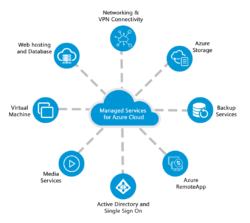The Future of Cloud Management: Unveiling Trends in Azure Managed Services
In the ever-evolving landscape of cloud computing, staying abreast of the latest trends is crucial for businesses aiming to optimize their operations. Microsoft Azure, with its suite of advanced tools and services, continues to lead the way in cloud management. In this blog post, we explore the future of cloud management and delve into the emerging trends within Azure Managed Services, shedding light on how businesses can leverage these advancements with the assistance of Microsoft Azure consultants.
 I. Introduction
I. Introduction
As businesses increasingly embrace the cloud, the demand for efficient and secure management solutions is on the rise. Azure Managed Services has emerged as a key player in providing a comprehensive suite of tools for businesses seeking to streamline their operations in the cloud.
II. The Current Landscape of Azure Managed Services
Before diving into future trends, it’s essential to understand the current state of Azure Managed Services. This section provides an overview of the core features and functionalities that make Azure a preferred choice for businesses worldwide.
III. Automation and AI Integration
a. Autonomous Cloud Management
Discuss the rise of autonomous cloud management within Azure, where tasks are automated, leading to increased efficiency and reduced operational overhead.
b. Integration of Artificial Intelligence (AI)
Explore how Azure Managed Services is incorporating AI for predictive analytics, anomaly detection, and intelligent resource allocation.
IV. Edge Computing and IoT Integration
a. Edge Computing in Azure
Detail how Azure is expanding its capabilities in edge computing, allowing businesses to process data closer to the source for reduced latency and improved performance.
b. Internet of Things (IoT) Solutions
Explore the integration of Azure Managed Services with IoT, enabling businesses to harness the power of connected devices and derive actionable insights from the generated data.
V. Serverless Computing
a. Function as a Service (FaaS)
Discuss the shift towards serverless computing models within Azure, where businesses can focus on their code without the need to manage underlying infrastructure.
b. Cost Benefits and Scalability
Highlight how serverless computing in Azure Managed Services offers cost benefits and scalability, allowing businesses to pay only for the resources they consume.

VI. Enhanced Security Measures
a. Zero Trust Security Model
Explore the adoption of a Zero Trust security model within Azure, emphasizing the continuous verification of identities and strict access controls.
b. Advanced Threat Protection
Discuss how Azure Managed Services is enhancing its threat protection capabilities, leveraging machine learning to identify and respond to evolving cybersecurity threats.
VII. Integration of DevOps Practices
a. DevSecOps: Security as a Priority
Explore the integration of security practices into the DevOps pipeline within Azure, emphasizing the importance of a collaborative approach for seamless and secure application development.
b. Continuous Deployment and Monitoring
Discuss how Azure Managed Services supports continuous deployment and monitoring, allowing businesses to deliver high-quality applications with speed and reliability.
VIII. The Role of Microsoft Azure Consultants
Throughout the exploration of these trends, it becomes evident that businesses will benefit immensely from the expertise of Microsoft Azure consultants.
a. Strategic Planning for Future-Proofing
Emphasize how consultants play a crucial role in strategic planning, ensuring that businesses adopt Azure features that align with their long-term goals.
b. Implementation and Integration
Discuss the hands-on role of consultants in implementing and integrating these advanced features within Azure Managed Services.
c. Training and Skill Development
Highlight the importance of ongoing training provided by consultants to empower businesses with the skills needed to navigate and maximize the potential of Azure.
IX. Realizing the Future: A Call to Action
In the concluding section, encourage businesses to proactively embrace these trends within Azure Managed Services. Emphasize the need for a forward-thinking approach and highlight how partnering with Microsoft Azure consultants can be a strategic move towards achieving this goal.
X. Conclusion
As we gaze into the future of cloud management, Azure Managed Services stands at the forefront of innovation. By understanding and implementing these emerging trends, businesses can position themselves for success in an increasingly digital and interconnected world, with Microsoft Azure consultants serving as valuable guides on this transformative journey.













